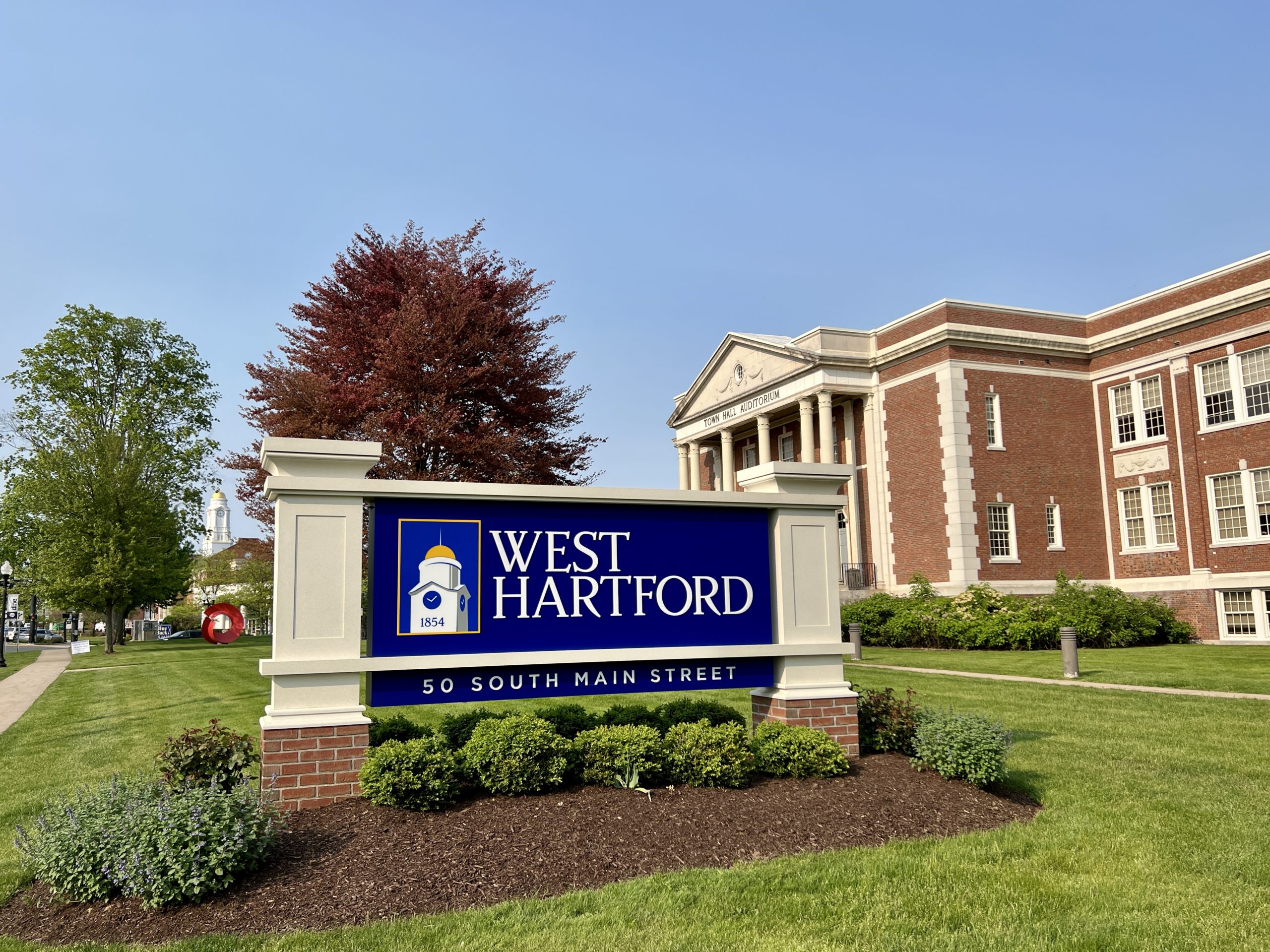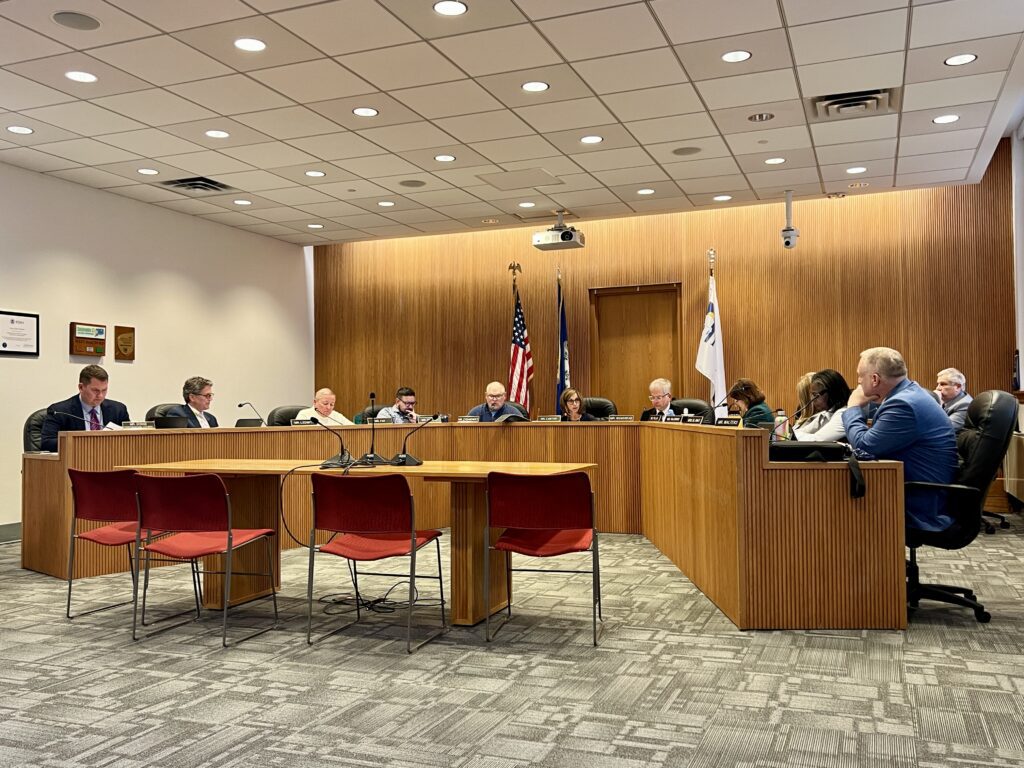West Hartford Town Council Adopts Budget with 3.49% Tax Increase

Audio By Carbonatix

West Hartford Town Hall. Photo credit: Ronni Newton
The West Hartford Town Council voted 6-3 Wednesday night along party lines to adopt the FY25 budget, which has been amended from the Town Manager’s original proposal.
By Ronni Newton
West Hartford’s FY25 budget has been modified from what was proposed by Town Manager Rick Ledwith on March 12, and the resulting $347,539,081 spending plan adopted by the Town Council in a 6-3 party line vote Wednesday night represents an increase of $16,348,417 (4.94%) over the current fiscal year’s budget.
The mill rate will be 42.35 mills – an increase of 3.49% – for real and personal property for the upcoming 2024-2025 fiscal year, up 1.43 mills from the current 40.92 mills. The average impact – based on the median assessed value (70% of the median sale price of $469,500) of a West Hartford home of $328,650 – will be an annual tax increase of $470, or $39.16 per month, according to analysis provided by Director of Financial Services Peter Privitera.
Ledwith’s original proposal had a mill rate of 42.9 mills for real and personal property, and would have increased taxes by 5.13%. The motor vehicle mill rate, which is capped by the state, will remain 32.46 mills.
A total of $2,081,236 in revenue adjustments has been made to Ledwith’s in March budget proposal, with the largest part of that the use of $1.5 million in American Rescue Plan Act (ARPA) funds as general fund revenue for FY25.
Following discussions that have taken place in Town Council committees over the past six weeks since the budget was proposed, there have been other modifications to expected revenues including an increase in estimated building permits of $50,000 – which Ledwith said they felt comfortable doing following approval last week of the development of 1700 Asylum Avenue. While it’s anticipated that the current high interest rate will be coming down, “we feel comfortable staggering that into the fiscal year,” Ledwith said, and the budget for investment income was increased by $100,000.
Also added to revenue was a $375,000 grant that is expected in the upcoming fiscal year from the Department of Energy and Environmental Protection for capping the town’s landfill.
Expenditure reductions of $1.5 million include eliminating the replacement of tasers and updates to the interview room for the police department from the general fund budget, a decreased health insurance appropriation of $110,000 resulting from favorable renewal numbers from the state partnership plan, and a reduction of $790,000 in the risk management fund. Year-end surplus will be allocated to the Capital and Non-Recurring Expenditure (CNRE) fund, out of which will come the expenses for the tasers and interview room upgrades, and surplus will also be used to replenish the $790,000 in the risk management fund.
Although the Town Council cannot make line item changes to the education budget, they will be reducing the allocation to the Board of Education by $500,000 from what was in the Town Manager’s original proposal, reducing the education budget – which is nearly 60% of the overall budget – to $200,803,856. (The Board actually requested $55,500 more than its original proposal when adopting its budget on April 4).
“The Council doesn’t have any legal opportunity to adjust where the Board of Education would make that adjustment,” Ledwith said, but he said he has had conversations with the superintendent and his team, and that they ideally would use a retiree health fund to offset the reduction in allocation to keep cuts out of the classroom.

The West Hartford Town Council met April 24 to adopt the FY2025 budget. Photo credit: Ronni Newton
Before the roll call vote on resolutions for budget appropriations and the tax levy, each Council member thanked Ledwith and town staff – particularly Privitera, who will be retiring next month – for their work.
“We are hopeful that this will be a bipartisan vote if at all possible. … We have certainly approached our discussions with those goals and we have ignored no idea,” said Deputy Mayor Ben Wenograd, who chairs the Council’s Finance Committee, noting that the budget provides proper balance.
“One of the biggest impacts on all budgets is inflation,” he said, which affects all residents and employees. “We expect a lot of our employees,” he added, and they need to be paid a fair wage.
Wenograd noted some of the challenges this year, including the $27 million decrease in motor vehicle values that was a major factor in minimal grand list growth. The previously-untaxed One Park development is beginning to provide revenue – $100,000 this year – and that will grow along with revenue from other developments that are under construction or recently approved.
Some of the previous budget drivers – the MDC ad valorem allocation, which was flat this year, and the pension allocation – are no longer issues. And, Wenograd added, “Our decision to join the state partnership plan [for health insurance] continues to pay off,” with the 5% increase in premium a much smaller number than self-insured communities are facing.
While the most significant change to the budget from the original proposal is using the $1.5 million in ARPA funds for tax relief, Wenograd said, it will not be creating a hole in the budget in future years. “We would not do this if we didn’t have guaranteed grand list growth based on construction projects already underway.”
Minority Leader Mark Zydanowicz, along with fellow Republicans Alberto Cortes and Mary Fay, voted against the budget. But Zydanowicz had praise for Privitera and other finance department staff, and for the professional work of Ledwith running the town and Superintendent Paul Vicinus for running the schools. He noted the accolades for Hall and Conard – including being named Tuesday among the top-10 high schools in the state – adding that it “takes a village” that starts at the elementary school level.
While Zydanowicz said that the Council committees have carefully reviewed the budget, “As a fiscal conservative, any number is too big sometimes,” he said. With using ARPA funds this year and counting on future grand list growth, he questioned where cuts are ultimately going to come from. “To roll forward, already anticipating a grand list growth going forward, I don’t want to go down that proverbial road already,” he said.
“None of us likes to raise taxes,” said Democrat Deb Polun, but in Connecticut there are not many choices to increase revenue. It’s particularly difficult in West Hartford since the revaluation several years ago disproportionately affected people who own homes at the low and moderate end of the scale.
Polun chairs the Human and Community Services Committee, and she noted the importance of what makes West Hartford a wonderful community – the “third spaces” like parks, outdoor pools, the indoor pool, three libraries, and two senior centers. “We have decided to commit to making these third spaces places where people want to be,” she said, including commitments to sustainability, expanding and improving parks, a new driving range at Rockledge Golf Club, softball dugouts at Norfeldt and Sterling fields, and expanding library hours and expanding access to collections.
“I am very, very happy that these adjustments have been made. Budgeting is never easy, it’s always very tough,” said Fay. Although she said the budget being discussed Wednesday was an improvement from the initial proposal, she said it still was not sustainable, particularly with the use of ARPA funds. “It’s a plug … to make a budget balance,” she said.
Approving this budget has ramifications beyond the current cycle since the budgets are roll-forward, said Fay, and West Hartford is in the upper quartile of mill rates in the state. “I’m just concerned and I think about some of the testimony we heard from our taxpayers,” she said, including how difficult it is to stay in our town and age.
“I know that a lot of blood, sweat, and possibly even tears went into this budget,” said Democrat Tiffani McGinnis, who chairs the Council’s Community Planning and Economic Development Committee. “It’s been a very busy year and I don’t see it letting up soon,” she said, noting roughly 70 new businesses have opened this year and dozens are in various stages of progress.
McGinnis highlighted the $800,000 Safe Streets for All (SS4A) grant the town received for Vision Zero efforts, and accomplishments of the building and planning divisions. West Hartford has 169 affordable units either completed or approved this year, the first Vision Zero action plan in the state, has completed two additional sections of Trout Brook trail, and held a groundbreaking for the renovation of West Hartford Fellowship Housing, which will add 43 new units.
“There was a lot of work that went into this budget to get it to the place we are tonight,” said McGinnis, a lot of asks. “The budget reality every year is that we are almost completely reliant on property taxes,” she noted, but added that the development of 1700 Asylum on the former UConn campus property will bring in close to $2 million in revenue per year when completed.
“Right now it’s needs… we put wants to the side,” said Cortes, who said he loves living in West Hartford. “It’s $16 million for needs … not to invest in the community,” he said, asking that it’s sad to have to be looking to recommend cuts instead of investing. “What can we do better for two years down the road?” he asked.
Democrat Carol Blanks chairs the Public Safety Committee, which carefully reviewed the budgets of the police, fire, and emergency services, all of which have the mission of protecting everyone in this town. “Personnel, training, equipment and supplies are critical … and it is a matter of life and death,” she said. The police and fire departments requested increases of 1.6% and 5.1% respectively, both of which are lean and prudent.
“I believe we have reached a reasonable budget that is sustainable for this town,” said Blanks, but “going forward we cannot continue to sacrifice our first responders,” and must continue efforts with the state legislature to keep our community safe.
“It’s not easy to balance the needs of everyone when you have financial restraints,” said Democrat Barry Walters, who said he doesn’t take raising taxes lightly. “Some departments did not get what they wanted,” he said, and will have to wait to get additional staffing.
The problem is the state’s system that forces reliance on property taxes, and on top of that then defies own system by not fully funding mandates.
“The importance of measured and intentional growth” is something we are lucky to have in West Hartford, said Walters, and that’s needed in all sectors – commercial, residential, and industrial. “Right now the market dictates higher density developments,” he said, and many of those create third spaces as well.
There “an incredible list of positive things we have to look forward to,” said Walters.
West Hartford is the ninth-largest community in the state, Mayor Shari Cantor said, but the only non-alliance district among the larger communities. The town has many community members that are wealthy and many who are in need.
“We are not by chance a triple-A bond-rated community,” she said. That’s very intentional, she said, and noting that the accolades the town has received, “this doesn’t come from short term thinking, short term fixes, or filling a hole.”
West Hartford has a very engaged community, Cantor said, and the “future is created by what you do today, not by what you do tomorrow.” Pension expense was largest driver in the town’s budget and has become relatively stable, with a reserve supporting fluctuations. The town is addressing the other challenges – housing, road safety, and sustainability – that she mentioned in her State of the Town address last month.
“Our budget is 87% real property taxes,” Cantor said. And as home values go up, “it’s a 2-sided story,” she said, because taxes increase as well. The median price of single-family homes in West Hartford has increased 28.4% since last year, and multifamily has increased 39.1%.
“I really struggled with putting ARPA money in this budget,” said Cantor, but knowing what is in the pipeline,”this is not a shot in the dark,” she said. “We haven’t seen this type of development in 20 years.” The town has improved policies on fund balance – and has the highest fund balance in the town’s history at 9.9% and will be a little higher.
“We’re building on solid economic health. We’re growing our tax base in a way that is … responsible,” said Cantor, thanking Ledwith, Vicinus, and Privitera for their leadership.
“Nobody is feeling happy with the budget. … We don’t want to have a property tax increase but we need our workers and we need our town staff,” Cantor said, and the town is well-positioned for the future. “I feel like what we are doing today is going to benefit our town in 10 to 12 years,” she said, adding that she appreciates the congeniality with which the town has finalized this budget.
Like what you see here? Click here to subscribe to We-Ha’s newsletter so you’ll always be in the know about what’s happening in West Hartford! Click the blue button below to become a supporter of We-Ha.com and our efforts to continue producing quality journalism.




Remember in November! We the People MUST remove these people from office! We need leaders who know to sharpen a pencil. I’m sure there is plenty of dead wood in the West Hartford government!